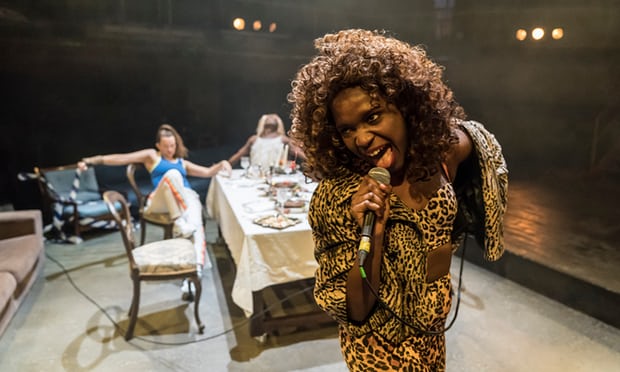Review: Jubilee at Royal Exchange Theatre
By Joshua Haigh

It’s always wonderful to see Toyah Wilcox on stage. Often remembered solely for her pop career, Toyah is also an actress. In 1977 she filmed Jubilee, Derek Jarman’s brutal meditation on the state of a Britain that was being soaked in royalist propaganda to mark 25 years of Elizabeth II’s reign. Toyah played an orange-haired pyromaniac called Mad. In Chris Goode’s new stage adaptation and updating of Jarman’s film, she plays Elizabeth I.
The forty year in between has seen the world transformed and the sometimes progressive, sometimes violently anarchic world of punk has been utterly transcended. Reviving punk for now and updating what many regard a seminal cult classic was always going to be an enormous challenge. Goode takes it on bravely but perhaps not boldly enough.
Curious about the future of her kingdom, Elizabeth I uses her alchemist to summon a spirit who transports her through time to the present day (not 1977 as is the film). She is horrified by the scenes of punk-fuelled dystopia that she witnesses. The punks are led by Amyl Nitrate in a brilliant performance from Travis Alabanza. Amyl reads aloud from a history book she is writing, a history that speaks critically of the failure of just about every system of government, thought and politics. Alabanza delights in the savagery of this analysis and brings compelling eloquence and anger to what could otherwise be quite stolid material.

The rest of the cast are a bit patchy. Tom Ross-Williams and Craig Hamilton, often gloriously naked, fizz with sexual chemistry and violent abandon as the incestuous brothers Angel and Sphinx. The slightly awkward ensemble could do with some of that fizz. Harold Finney is commanding as John Dee, but fails to live up to the gift of a part that is Borgia Ginz, the crazed billionaire who owns just about everything and everyone.
The original screenplay was a caustic and shocking montage of scenes that not only presented the liberating anarchy of punk, but also foresaw the sweeping changes to come in the 1980s. In the film, Borgia Ginz is the mirror opposite of Elizabeth I, a dark angel from the future come to taunt us with what our indifference may allow to happen. One of the problems for Goode in adapting the material, is that much of Jarman and Whaley’s prophetic vision has come true. It is the world we now live in, and which many simply accept. So, what do you do with the script?
Rather than trusting that the original still bristles with relevance and having the confidence to keep it in period, Goode has decided on an uneven and uneasy update. The characters are both the same and changed. The play is firmly in the present, but the punk aesthetic remains from the past. Goode might have done better to be less reverential, to take the film simply as a point of inspiration and make something more strongly in his own voice, which is an accomplished and insightful one.
It is fantastic to see Derek Jarman’s characters alive again and some of the performances pivot those characters successfully in new directions. Many elements of the show are well rendered. But the striking resonance of the source work is never quite found. Goode’s respect for Jarman has meant there are many wonderful moments, but it may also have got in the way of making an even better piece of theatre.
4 STARS
Screenplay: Derek Jarman
Stage Adaptation: Chris Goode
Director: Chris Goode
Reviewer: Stephen M Hornby
